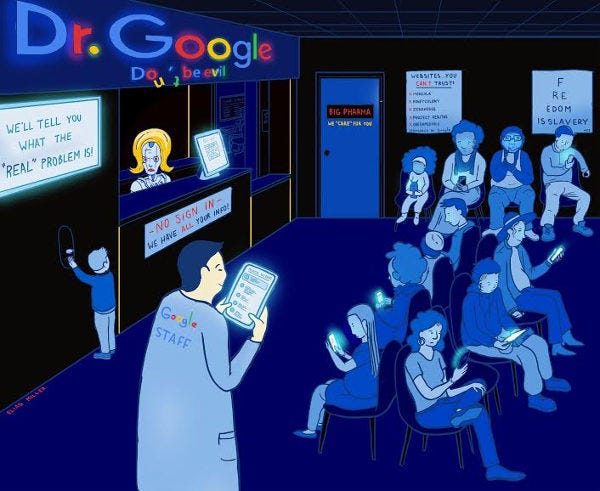eliasmillerart.com
Follow: Twitter | Instagram | Telegram | Gab | Facebook
Truth Lives Here: Rumble | Rokfin | Odysee | Brighteon | Bitchute | YouTube
Websites: MaryamHenein.com | HoneyColony.com
READ:
Dr. Google Will See You Now (Part 1)
Deep State: Deep Data
The world's most precious asset today is no longer oil but data. Big Tech collectively racked up over $25bn in net profit in the first quarter of 2017, according to The Economist. By 2029, the big data analytics market is expected to reach more than 655 BILLION!
Let's look at some of Google's statistics:
Google indexes more than 45 billion web pages; its next-biggest competitor, Microsoft's Bing, indexes a mere 14 billion in comparison.
Every minute, an estimated 3.8 million queries are typed into Google.
As the number one visited website in the world, Google receives 5.6 billion searches per day controlling 90% of global search traffic.
People use Google to search for about 1 billion health questions a day," according to author and health professional Joe Cohen, who has been censored by Google.
Eighty percent of internet users have searched for a health-related topic online, according to a recent study.
Google has long been investing in DNA repositories, according to Epstein. In 2008, Google invested in geneticist George Church of Harvard University in Cambridge, Massachusetts and his team who were decoding the human genome, reported Bloomberg. Google was a primary investor in 23andMe, which was co-founded by Anne Wojcicki, Google co-founder Sergey Brin's now ex-wife. Google invested at least $6.5 million. Brin loaned 23andMe $10 million.
Navigenics and Editas Medicine Inc. has also received money from Google. Calico, a biotechnology firm created by Alphabet delved into the genetic database Ancestry.com to look for hereditary influences on longevity.
"When DNA profiles become part of people's dossiers, Google will have crossed a potentially frightening threshold: it will know far more about people than they know themselves - what diseases people are likely to get (think of the marketing opportunities), what their racial origins are, which dads have been cuckolded. The possibilities are endlessly outrageous," Dr. Epstein wrote in an opinion piece titled Google's Gotcha for U.S. News & World Report.
Google wields a lot more power over you when combined with so many other data sets.
Project Nightmare: Your Life In A Cloud
On November 12, 2019, The Wall Street Journal reported that Google and Ascension, the second-largest health system in the country, secretly shared the records of patients in 21 states. Fifty million American patients weren't notified or allowed to opt in or out. Doctors weren't either.
The collaboration, which began last year, was named "Project Nightingale" and it aimed to crunch health data for treatment and administrative purposes. And then transfer it all to its Google Cloud division, which develops AI-based services for medical providers.
Google Cloud President Tariq Shaukat said in a blog post the day before WSJ broke the story that Project Nightingale aims to improve "healthcare experience and outcomes."
"Some of the solutions we are working on with Ascension are not yet in active clinical deployment, but rather are in early testing," he wrote. "This is one of the reasons we used a code name for the work - in this case, 'Nightingale.'"
In addition to the Cloud team, Google employees with access to patient data included members of Google Brain, which focuses on AI applications.
According to The Guardian, "Google has entered into similar partnerships on a much smaller scale with clients such as the Colorado Center for Personalized Medicine. But in that case, all the data handed over to the search giant was encrypted, with keys being held only on the medical side."
The deal between Google and Ascension was formally signed hours after The Wall Street Journal broke the story.
Google affirms that everything they are doing with Ascension is on the up and up since it's serving as a business associate, which grants them identifiable health information, albeit with legal parameters.
Google isn't charging Ascension under the notion that this is a pilot project of sorts to see about selling the data to other healthcare providers, now using their "super" data sets.
Via email, Ascension Executive Vice President Nick Ragone responded to allegations of a data leak stating:
"Where was it reported that there was a data leak or breach?????? We've actually blogged about this collaboration with Google so that we can clear up the sloppy and misinformed reporting on this - appreciate your taking the time to check with us on the fact."
Google also reiterated innocence with its own release.







